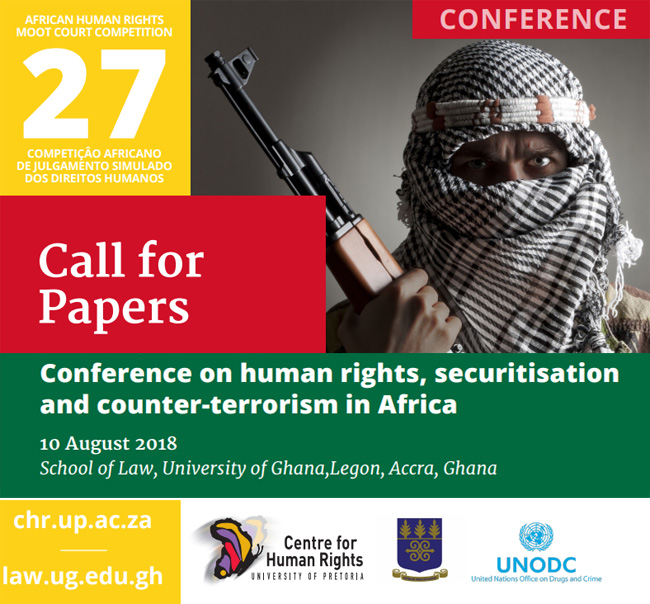The Centre for Human Rights, University of Pretoria and the School of Law, University of Ghana, Legon, in collaboration with the United Nations Office on Drugs and Crime (UNODC) are pleased to announce a one-day conference on human rights, securitisation and counter-terrorism in Africa and hereby invite proposals for papers. The conference will be held as part of the 27th African Human Rights Moot Court Competition.
Background and aim of the Conference
Terrorism (including other forms of violent extremism) and counter-terrorism measures bear strong relations to human rights in a number of ways. First, terrorism “thrives in environments of dejection, poverty, political oppression, extremism and human rights abuse”.
Second, terrorism constitutes “a global threat to democracy, the rule of law, human rights and stability”. Third, counter-terrorism measures are intended to restore the conditions for the respect of human rights and human dignity. Fourth, counter-terrorism strategies have the tendency to erode or corrode the values of human rights in the name of national security. Counter-terrorism measures have a tendency to (further) disenfranchise particular communities who may end up becoming radicalised. The result is a cycle of terrorism and rights violations.African States, in their attempts through the OAU and now the African Union (AU), have adopted a number of resolutions and declarations, treaties, principles and guidelines and a model law to counter terrorism on the continent. In spite of these efforts, terror groups such as Boko Haram (operating in Nigeria but also active in Chad, Niger and northern Cameroon), Al-Shabaab (Somalia and Kenya), Al-Qaeda in the Islamic Maghreb (Algeria, Mali and Burkina Faso) and Al Gama’at al Islamiyya in Egypt seem to be on the rise. At the same time, peoples fighting for external self-determination – such as in Anglophone Cameroon, the Igbos in Nigeria, the Oromos in Ethiopia and the Seleka/Anti-Balaka in the Central African Republic cause tensions to increase. Other forms of violence and internal strife are common, such as inter-communal conflicts, mercenary activity and the rapid growth of the private security sector, in the form of the private military/security companies, to fight insurgency. This situation is compounded by the “War on Terror” being waged by the Unites States and its allies. In response, most African leaders have exploited this initiative and “securitized” their environment by shrinking political space and criminalising dissent in the name of national security. Somewhere within that mix, individual security and human rights have become a forgotten issue.
Against this backdrop, the one-day conference aims to highlight the existing gaps in the AU human rights-security architecture, and assess how scholars of international law, international human rights law, international humanitarian law, security law, security studies and related fields can draw on the initiatives of the United Nations Office on Drugs and Crime (UNODC)’s Education for Justice (E4J) to address these gaps
Themes of the Conference
Prospective presenters are encouraged to submit abstracts that reflect the overall theme of the conference. The following non-exhaustive list of topics may provide some guidance to prospective presenters:
- Human security, the responsibility to protect (R2P), article 4(h) of the AU Constitutive Act and terrorism;
- The role of the private security sector in African states, and its impact on securitisation and counter-terrorism;
- How Africa’s security architecture addresses or can address the four ways in which security and human rights relate;
- Whether the Constitutive Act of the African Union (AU) provides a framework broad enough to draw the proper linkages between human rights and security;
- Assessment of the role of the AU Peace and Security Council (and its constituent organs such s the Panel of the Wise) in addressing terrorism and its root causes, and increasing securitisation in African states;
- In-depth exploration of the links between securitisation and counter-terrorism;
- Comparative analysis of counter-terrorism measures between the AU and other regional organisations;
- Review of the counter-terrorism efforts/record of the African Commission on Human and Peoples’ Rights with respect to its decisions, resolutions, etc;
- Civil society and the promotion of effective human rights-compliant counter-terrorism measures in Africa;
- The historical experiences and understanding that have shaped the crafting of counter-terrorism narratives in Africa;
- Root causes of extremism – human security versus national security;
- AU position on uti possidetis and its contribution to violent extremism/terrorist acts by indigenous groups;
- Access to information, secrecy laws and national security – the linkages;
- The potential and actual impact of the African Model Anti-Terrorism Law;
- The extent to which the death penalty is used as part of counter-terrorism measures;
- Child soldiers, child rights and terrorism/violent conflict;
- The role of the African Committee of Experts on the Rights and Welfare of the Child in addressing the root causes of terrorism and other factors relevant to children;
- Definition of terrorist offences by the AU – and national jurisdictions in Africa – and its the impact on human rights.
Process – Potential Presenters
If you are interested in presenting a paper at the conference please submit an abstract of 400-500 words in word format to accraconference2018@gmail.com, by 18 June 2018. Please include a brief bio with your abstract and indication on whether you would need financial support to attend the conference. Selected presenters will be informed by the end of June.


